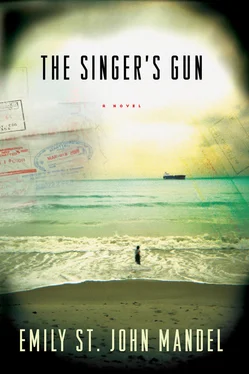At one o’clock she went back to World Trade Center 7, sat in Broden’s office while Broden took notes. She found herself staring out the window at the blue sky and glass towers outside. Thinking of the far north, of exile and snow. Elena had been on the front page of her hometown newspaper when she’d made it into Columbia on full scholarship; imagine the stories if she came back in handcuffs. But would they bother to take her as far as Inuvik? Of course not. It was a two-thousand-dollar ticket. A shorter flight, then, hauled over the border to the closest major Canadian city. Abandoned in Toronto or Montreal at nightfall, still three thousand miles from home and New York City lost forever on the other side of a closed border, her name on a list at Customs, oh God.
“Elena.” Broden was leaning forward in her chair, and Elena realized from her tone that she had said Elena’s name more than once.
“I’m sorry.”
“Do you have the tape?”
“Yes,” Elena said. It was in her handbag. She fumbled about until she felt the hard plastic edge of the case under her fingertips, and she unexpectedly burst into tears. “I’m sorry,” she said. “I’m sorry, I never do this. I never cry in front of people.”
Broden had produced a box of tissues from somewhere, and she passed it to Elena without a word. Elena pressed two tissues to her face and forced herself to be still. She stood up, straightened her skirt, and placed the tape on the desk on her way out of Broden’s office. She didn’t look back, but she felt Broden’s eyes on her as she left.
Strange to go back to the office, after such a meeting. Her reflection in the darkened window of the subway car, staring back at herself. At Grand Central Station she walked very slowly across the main concourse, the vast space filling up already even though it was only three in the afternoon, executives rushing to catch their trains home to Westchester County. In the elevator Elena pressed every button to buy time and the doors opened and closed on other people’s working lives; glimpses of beige carpets, white marble, dark wood, glass walls, a woman walking with a cup of coffee. On the twenty-second floor she left the elevator and opened the door to the office, walked past Nora without looking at her and went to her desk. The paper she was supposed to be proofreading blurred before her eyes. Nora’s voice was distinct over the top of the cubicles—“You know, Mark, when I write you a memo, you should probably read it”—and the fluorescent lights hummed softly overhead.
Elena put down her red pencil and closed her eyes. All her life she’d paid attention to last moments — the last moment before a catastrophe, the last moment before a surprise, the last moment before you open the envelope from Columbia University in the living room in your arctic hometown with your parents standing breathless in the doorway — and she’d come to recognize last moments when she saw them. This was the last moment she could stand to go on like this.
Elena took a page from her inbox, wrote I QUIT on the back in block letters, signed her name, and slung her handbag over her shoulder. She walked past Nora’s desk and dropped the piece of paper in Nora’s inbox, but Nora was preoccupied with insulting someone else and didn’t notice. By three forty-five P.M. she was outside in the haze of midtown Manhattan, as free and as lost as she’d ever been.
The party was in a brownstone on a tree-lined block off Broadway, high up on the island near the university gates. It was miles from the office but Elena walked there anyway, a slow northwestern movement across the span of a city and an afternoon. She would walk until the heat was overwhelming and then step into a Starbucks — there seemed to be one every three and a half blocks or so — and walk out of the air conditioning with a plastic cup of something sugary and frozen in her hand. The air was dense and heat waves shimmered over the street. She alternately sipped iced coffee and pressed the cold cup to her forehead as she walked, thoughts of Broden and Anton and the job she’d just quit and Caleb drifting together and sifting to white. The walk through Central Park was the hardest stretch; a few steps in and the sound of traffic vanished, the landscape closing in around her like an implosion. There was a weighted quality to the park, a hush, footsteps almost silent and her heart beating too fast, dragonflies gliding on imperceptible breezes under the pressing canopy of trees. There were few people here at this hour, in this heat: a woman pushing a red-faced child in a stroller; a runner almost staggering, streaked with sweat; a man sitting alone on a bench with his possessions in plastic bags around him, singing quietly and scattering seeds to a congregation of pigeons. Day fell into twilight, but twilight brought no relief.
When Elena emerged from the park at 110th Street her head was light and there was a confused shifting darkness at the center of her vision. She bought plantain chips and Gatorade in a tiny bodega and pressed on against the air. She was dizzy. Her breath was ragged. Caleb had given her the address but it took her a while to find the place, walking somnambulant along a tree-lined street until she saw the number, the door ajar. There were voices coming from inside. It took a few minutes to make it up the steps.
She pushed the door open and slipped into the foyer. The crowd was larger than she’d thought it would be, but she recognized no one. The living room looked more or less the way she would have expected a professor’s living room to look: deep red walls hung with African masks, bookshelves overflowing their contents onto side tables and chairs. Caleb was nowhere. Elena wanted to sit down, her legs were aching, but every chair and sofa seemed taken. She settled for leaning against a wall in dazed silence. The room was well air conditioned; her sweat dried on her face. She thought she recognized a face or two in the crowd, old classmates from her astrobiology days, but no one she’d been close to or whose names she remembered — had she been close to anyone besides Caleb at school? It was unclear in retrospect, and no one here seemed to see her. More people were coming in from outside, and everyone seemed to know each other. The room was becoming more crowded and she was becoming more alone.
“Ellie?”
The photographer was grayer than she remembered, but with the same appraising eye. Her initial impression, when she’d met him for the first time three years earlier, was that he had the look of a man who’d seen too many naked women in his lifetime.
“Leigh,” she said. “What are you doing here?”
“My wife teaches up at Columbia. We’re friends of Dell’s. Are you okay? You’re a little flushed.”
“Fine. A little hot. The temperature out there. .” She gestured weakly.
“I know, it’s brutal. Here’s to air conditioning.” He raised his glass. “What brings you to the party?”
“My boyfriend’s working on the plant genome thing.”
“You’re dating a professor?”
“He’s a Ph.D. candidate.”
“What’s his name?”
“Caleb. Caleb Petrovsky.”
“Tall, kind of lanky? Light brown hair, falls in his eyes a little?”
“You know him?”
“We were just introduced. Didn’t realize he was yours.”
“Is he here somewhere?”
“He’s talking to Dell in the kitchen.”
Elena nodded and sipped her Gatorade, suddenly not at all sure that she wanted to see Caleb after all. He would ask how work was, she would tell him she had quit her job, he would look at her strangely and they’d fall into an awkward silence, et cetera. She contemplated slipping out. Across the room, a girl she remembered from a long-ago biology class was holding court in a circle of men; she caught “—but if you focus just on the chloroplast—” before Leigh cleared his throat.
Читать дальше





![Ричард Деминг - Whistle Past the Graveyard [= Give the Girl a Gun]](/books/412176/richard-deming-whistle-past-the-graveyard-give-t-thumb.webp)






